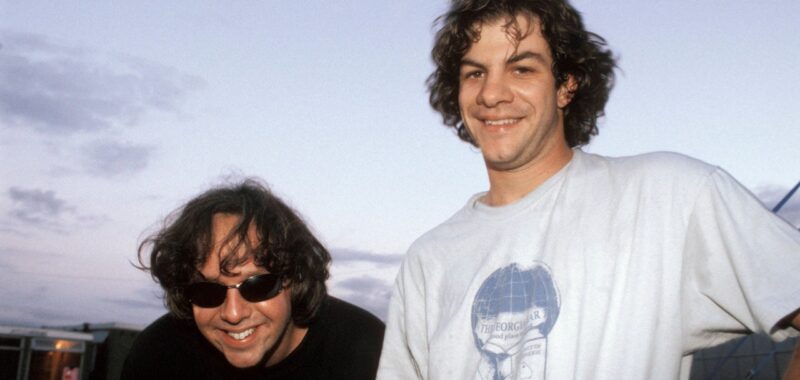A deluxe reissue of Ween’s 1994 psychedelic masterpiece Chocolate and Cheese hits stores and streamers today, in advance of the album’s thirtieth anniversary next month. Of all the unlikely indie artists who got a wild-card shot at pop stardom after Nirvana broke, Aaron Freeman and Mickey Melchiondo—known professionally as Dean and Gene Ween—might be the most improbable: a pair of high-school buddies from New Hope, Pennsylvania whose first two albums toggled between chemical-huffing hardcore noise and inspired, warped homages to ’70s pop schlock. They played guitar like beasts and frequently sang like Eric Cartman risen from hell. When they signed to a major label for 1992’s Pure Guava, they changed almost nothing about their approach, recording in the same farmhouse and with the same equipment—but Pure Guava had “Push Th’ Little Daisies,” a minor alt-rock hit which got even bigger after Beavis and Butt-Head roasted it on MTV. “These guys,” Butt-Head proclaimed, “have no future.”
Chocolate and Cheese was the future: Ween got a budget and booked time in an actual recording studio, and emerged with the most focused and well-crafted music they’d ever made, from “Freedom of ‘76” (which now sounds like Ween inventing Mac DeMarco’s sound) to “Voodoo Lady” (a slapstick banger seemingly designed to make the Chili Peppers hang up their socks in shame.) They hadn’t shed their audio-shitpost instincts entirely; a track like “The H.I.V. Song,” too stupid to qualify as offensive, is arguably an example of the band that wrote “Touch My Tooter” and “Flies On My Dick” refusing to compromise their principles. But the very next track is the comedown ballad “What Deaner Was Talking About,” the prettiest song they’d written to that point, save maybe this album’s “A Tear For Eddie,” an instrumental memorial for Funkadelic’s late guitarist Eddie Hazel. They’d never been part of any scene or movement, and they still weren’t, but in chasing their own strange muse they’d somehow arrived in the same aesthetic zone as fellow Gen X eclecticists like Beck, Cibo Matto, Cornershop, and the mid-period Beastie Boys, who put out the vinyl version of Chocolate on their Grand Royal label.
It was a moment and it faded; they followed up C&C in 1996 by recruiting esteemed Nashville session guys to make a wearisome country record, and by the time they rebounded in ‘97 with The Mollusk, the world had mostly moved on (although everyone from Kurt Vile to Spongebob Squarepants creator Stephen Hillenburg would later praise that nautical odyssey of an album as the mindblower that it is.) Also, around that time, Phish started covering Chocolate and Cheese’s “Roses Are Free,” sometimes at great length, turning more than a few Phishheads into Ween devotees in the process.
Aaron Freeman sought treatment for substance abuse after an onstage meltdown in 2011; the following year he told Rolling Stone that the band had broken up and that his time with Ween was a “closed book.” In 2015, after Phish played “Roses Are Free” at a show in Ohio, Trey Anastasio delivered an entreaty from the stage: “Ween—one of my all-time favorite bands—time to get back together and start playing.” Eventually, in 2016, they did, and went on to open for Phish at a festival in Virginia that same year. They seemed determined not to milk their jam-band cred, though; after the show, Melchiondo wrote a blog post ripping Phish’s audience and said that the only part of the gig he’d enjoyed was meeting Peter Wolf from the J. Geils Band. “[H]e was the only dude at the festival i could relate to at all. like, the only motherfucker except the guys in my band that really understands rock and roll and is still doing it.”
Unlikely hitmakers turned unlikely lifers, Ween are still doing it to this day; if you happen to be in Montana, you can see them play this weekend, part of a year-long tour celebrating the fortieth anniversary of the band’s formation. Not bad for two guys with no future.

